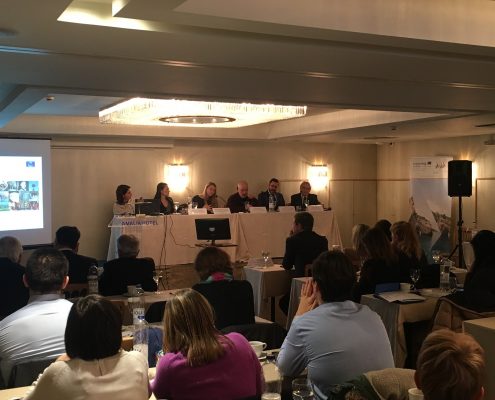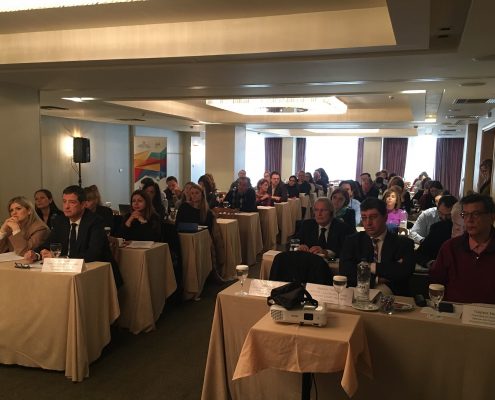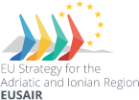EUSAIR Workshop on Cultural Tourism and Local Identity
The first EUSAIR Workshop on “Cultural Tourism and Local Identity”, organized jointly between the Hellenic Ministry of Tourism and the Hellenic Ministry of Economy and Development (EUSAIR Facility Point- Greece) successfully concluded on the 30th of November 2018, in Athens.

The theme is included in the priority "Cultural Tourism and Local Identity" selected by Greece within the framework of the 4th Pillar "Sustainable Tourism" of the EU Strategy for the Adriatic and Ionian Region (EUSAIR), which refers to the diversification of the tourist offer while respecting the principles of sustainable development and in order, inter alia, to extend the tourist season and the diffusion of the benefits of tourism development.
The ultimate goal of the Workshop was to raise awareness and deepen the co-operation among all stakeholders of the Adriatic-Ionian Macro-Region, including Albania, Bosnia and Herzegovina, Italy, Croatia, Montenegro, Serbia, Slovenia and Greece towards the development of cultural routes and products.
Mr. George Tziallas, Secretary General for Tourism Policy and Development, addressed the Workshop at its opening. Keynote speakers were Ms. Panagiota Dionysopoulou, Head of the General Directorate of Tourism Policy of the Ministry of Tourism, the National Coordinators of the Strategy for the Adriatic and Ionian Region (EUSAIR), Mr. Ioannis Firbas, from the Ministry of Economy and Development and Mr.Vassilis Tselios from the Ministry of Foreign Affairs and Mr. George Kalamantis, Head of the International Relations and EU Directorate of the Ministry of Culture and Sports.
The key point of the workshop was the reinforcement of macro-regional cooperation, the contribution of the EU Strategy to sustainable tourism development through the creation of thematic products and cultural routes as well as the promotion of the local identity of the destinations.
Ms. Catherine Kontoudaki, Head of the Department of International & EU Affairs of the Ministry of Tourism, opened the first session, making a brief presentation of Greece's policy on cultural tourism, while presenting the profile of cultural travelers , the routes in which Greece actively participates and the tools for implementing the National Strategy. Subsequently, Ms. Marianne Berger Marjanovic Chair of the Enlarged Partial Agreement on Cultural Routes of the Council of Europe (EPA), Mr. Luca Bruschi, Responsible for EHTTA Foreign Relations and Mr. Paolo Benvenuti, Iter Vitis President, presented the possibilities of certification of routes, participation of potential members, cultural activities and actions contributing to the strengthening of international cooperation and the exchange of best practices.
The Representatives of FP and FPP, Ms Staša Mesec and Dimitrij Kuzmić, referred to the existing tools for cross-pillar project funding under the Strategy. In this context, Ms. Despina Tamanidi, Head of the Department of Tourism Policy Planning of the Ministry of Tourism, presented the National Marketing Strategy, a main pillar of which is to encourage and promote the cultural tradition of our country.
The Cultural Route "The Routes of the Olive Tree" was presented as best practice and the first Greek Route that has been certified by the Council of Europe in the framework of the EU Strategy while Mr. Stratos Ioannou, Deputy Regional Governor of Regional Unit of Preveza & Responsible for Tourism Development of Epirus Region, Mr. Kostas Fasoulakis, Deputy Regional Governor for Culture, Region of Crete and Mr. Alexandros Thanos, Deputy Regional Governor of Region of Central Macedonia for Culture and Tourism presented their Regional development Strategy on cultural tourism, their communication policy and the forthcoming program of actions, respectively.
All three Regions, in cooperation with the Ministry of Tourism, focus on cultural tourism’s development as they identify the importance of cultural identity and heritage as a key challenge in the sustainable local development.
Cultural tourism constitutes a pillar of the National Strategy of the Ministry of Tourism and a component of its National Tourism Policy 365 days a year.
You might be interested in
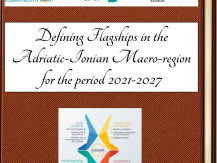
EUSAIR flagships all summed up!
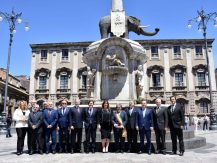
3rd EUSAIR Annual Forum – CATANIA DECLARATION

The Hellenic Republic assumes the Presidency of the EU Strategy for the Adriatic and Ionian Region (EUSAIR) (1 June 2024 – 31 May 2025)




